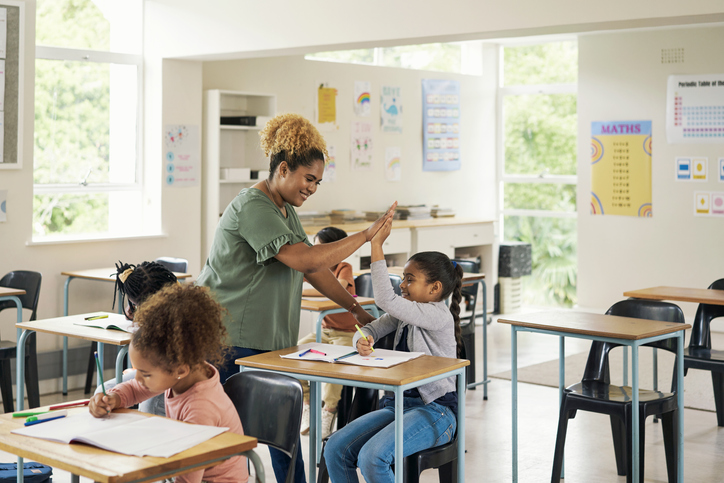Black Educators, Organizers Focus On ‘Teaching With Tenderness’
Black Educators And Organizers Focus On ‘Teaching With Tenderness’

Source: pixdeluxe / Getty
This Teacher Appreciation Week, education justice advocates and educators once again sounded the alarm on inequities in education that impact teachers and children alike. The Communities for Just Schools Fund (CJSF), D.C. Area Educators for Social Justice and Black Lives Matter at School illuminated some of these concerns during a briefing on school culture this past Thursday. The event was facilitated by Kimberly Ellis and Erika Roberson of CJSF and featured current and former educators Dr. Denisha Jones, Vanessa Williams and Nkenge Robertson. They made an appeal for improving the school environment by increasing autonomy for educators and students alike with Jones warning that “teachers cannot give agency to students if they don’t have it themselves. Black and brown students lack agency in schools so this is important.”
“Prior to COVID, we knew from research that most students reported experiencing bullying at school,” Dr. Jones, who is a former educator, said. “Educators reported having some autonomy in the class but far less power over curriculum. Post-pandemic we have also surveyed teachers. We learned teachers have felt unsafe because of the pandemic, like they were thrown under the bus because schools wanted to reopen, and teachers were concerned about risking the health of their loved ones at home. It was a generally stressful experience for most educators. We have learned that teachers are morally injured; they go into the profession wanting to do right by children and that’s a moral value they bring to the work. When they can’t do that, it is a moral injury and an affront to who they are as people and as parents.”
Robertson, an educator, highlighted practices she’s adopted to address racial violence in education and supporting young people.
“I’m addressing racial violence in educational spaces by embracing the ‘teaching with tenderness’ practice,” Robertson said. “This is looking at students from a holistic perspective – emotionally, physically, spiritually, and academically; if those things are not aligned, I cannot educate the whole child. The spaces that education systems uphold don’t always promote that; it’s always academic first, it’s always bias testing first and always centered around whiteness which makes. This makes public schools in urban areas not places of hope, justice, love. They are places where students aren’t fond of coming.”
The educators and organizers offered multiple recommendations for how school culture could be improved, including play labs, paying teachers more, supporting conflict resolution and increasing educators’ autonomy.
One audience member, Aisha Norris, founder of DREAM!, urged conflict resolution resources for students: “I would like to see conflict resolution as part of the educational experience for our young people. We often question the behavior of young people and why there’s a rise in violence in communities. But we need a way for our young people to understand the language of peace and resolve. This could heal our communities.”
“One of the things we can do is listen to teachers and respond to them,” said Williams, a former educator who is now a program manager with D.C. Area Educators for Social Justice. “We want teachers to name what they need and for the community to be in solidary with them. This is going beyond platitudes; we want people to say and show that they care.”
“Teaching is not a job that ends at 3:00 p.m. It follows us into the home and traverses’ weekends. Teachers must be valued and paid more,” Robertson said. “We must change the climate, the micromanaging and the policing of grown adults.”
The Thursday briefing was held amid a period of intense pressure on educators, which is driving teachers out of schools and chilling the kind of intellectual discourse that builds students’ critical consciousness. This includes book bans and the targeting of educators and administrators over the teaching of America’s history. It has also included teacher fines for discussing racism or oppression and gag orders preventing certain conversations, or bills seeking to ban lessons on or student credit for advocacy and activism.
We must ensure educators have the support and resources they need to work with students and families to create holistically safe and supportive learning environments. And this work must happen now. We have zero time for delays. To echo the sentiment of Dr. Jones, “Schools can either be spaces where all children experience joy, thriving and possibilities, or they can be a place where some children are traumatized, spirit-murdered, and marginalized.”
I hope we choose the best for our children, and that includes investing in educators and creating learning environments that heal not harm.
Jennifer R. Farmer is the author of “First and Only: A Black Woman’s Guide to Thriving at Work and in Life,” and founder of Spotlight PR LLC. She is a consultant for the Communities for Just Schools Fund.
SEE ALSO:
Op-Ed: For Early Childhood Education, We’re At Mission Critical
Diversity In Education: Why We Need More Black Male Teachers
















